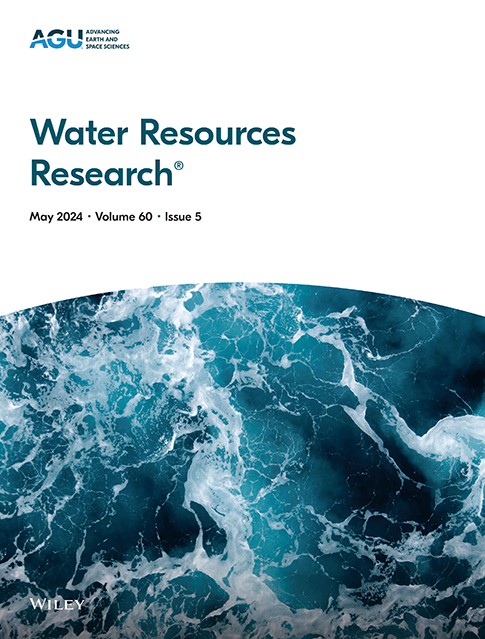太平洋西北部弗雷泽河谷地下水对洪水和干旱的响应
IF 5
1区 地球科学
Q2 ENVIRONMENTAL SCIENCES
引用次数: 0
摘要
地下水位变化是叠加物理过程的信号,具有记忆功能。地下水位记录可用于了解含水层系统如何对自然和人为扰动做出反应。在这里,我们分析了太平洋西北部不列颠哥伦比亚省(BC)南海岸的地下水位,目的是确定地下水对大气河流(ARs)和干旱的响应。我们得出了大气河流目录,并将降水量与大气河流的发生联系起来。干旱是通过干旱日指标和标准化降水指数来量化的。从历史数据来看(1980-2023 年),9 月至次年 1 月,约 40% 的总降水量来自 AR。从 4 月到 9 月,50% 以上的天数没有降水,通常会出现连续 26 天的干旱。我们利用地下水位的自相关结构(通常用于描述含水层的记忆特征)来确定观测井反应的两个不同组群。第 1 组水井对来自当地降水(主要是降雨)的补给做出反应,在冬季补给和夏季降雨量明显不足时对自相关系数做出快速反应。第 2 组水井受当地降水驱动,但受到菲沙河夏季大量清水的影响,清水会短暂补给含水层,从而延缓干旱的传播。结果表明,地下水记忆包含多种水文地质因素,包括影响极端事件响应结果的边界条件。本文章由计算机程序翻译,如有差异,请以英文原文为准。
Groundwater Responses to Deluge and Drought in the Fraser Valley, Pacific Northwest
Groundwater level variations represent signals of superimposed physical processes, with memory. Groundwater level records are used to understand how aquifer systems respond to natural and anthropogenic perturbations. Here we analyze groundwater levels across the South Coast of British Columbia (BC) in the Pacific Northwest with the objective of determining groundwater responses to atmospheric rivers (ARs) and drought. An AR catalog was derived and used to associate precipitation amounts to AR occurrence. Droughts were quantified using dry day metrics, in conjunction with the standardized precipitation index. Historically (1980–2023), from September to January, approximately 40% of total precipitation was contributed by ARs. From April to September, more than 50% of days received no precipitation, with typically 26 consecutive dry days. We used the autocorrelation structure of groundwater levels, commonly used to characterize aquifer memory, to identify two distinct clusters of observation well responses. Cluster 1 wells respond to recharge from local precipitation, primarily rainfall, and respond rapidly to both ARs during winter recharge and significant rainfall deficits during summer. Cluster 2 wells are driven by local precipitation but are influenced by the Fraser River's large summer freshet which briefly recharges the aquifers, thereby delaying drought propagation. The results suggest that groundwater memory encapsulates multiple hydrogeological factors, including boundary conditions, influencing the response outcome to extreme events.
求助全文
通过发布文献求助,成功后即可免费获取论文全文。
去求助
来源期刊

Water Resources Research
环境科学-湖沼学
CiteScore
8.80
自引率
13.00%
发文量
599
审稿时长
3.5 months
期刊介绍:
Water Resources Research (WRR) is an interdisciplinary journal that focuses on hydrology and water resources. It publishes original research in the natural and social sciences of water. It emphasizes the role of water in the Earth system, including physical, chemical, biological, and ecological processes in water resources research and management, including social, policy, and public health implications. It encompasses observational, experimental, theoretical, analytical, numerical, and data-driven approaches that advance the science of water and its management. Submissions are evaluated for their novelty, accuracy, significance, and broader implications of the findings.
 求助内容:
求助内容: 应助结果提醒方式:
应助结果提醒方式:


